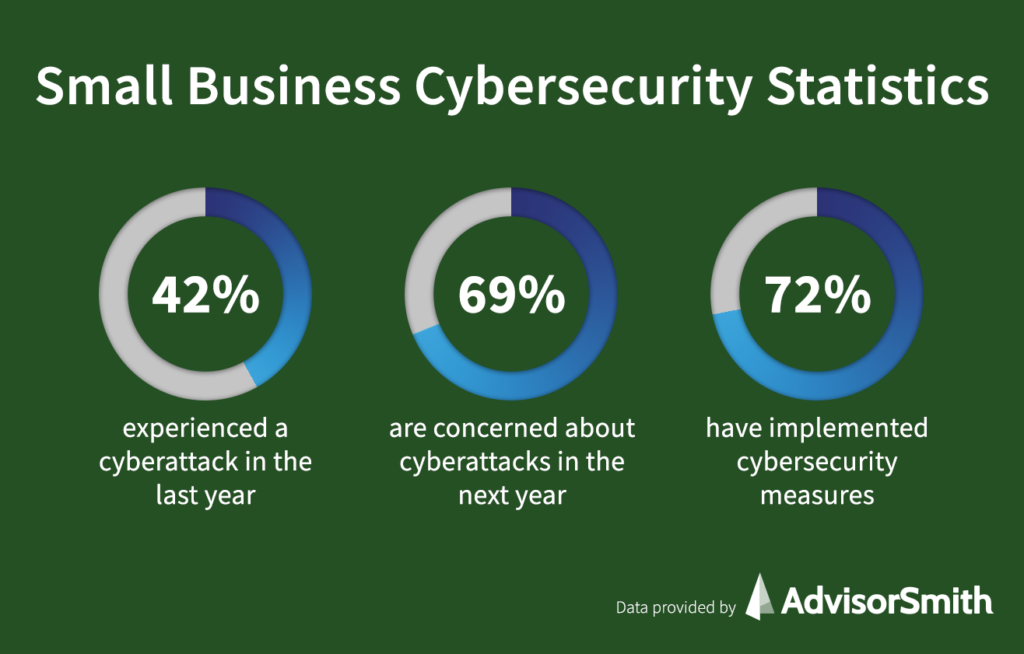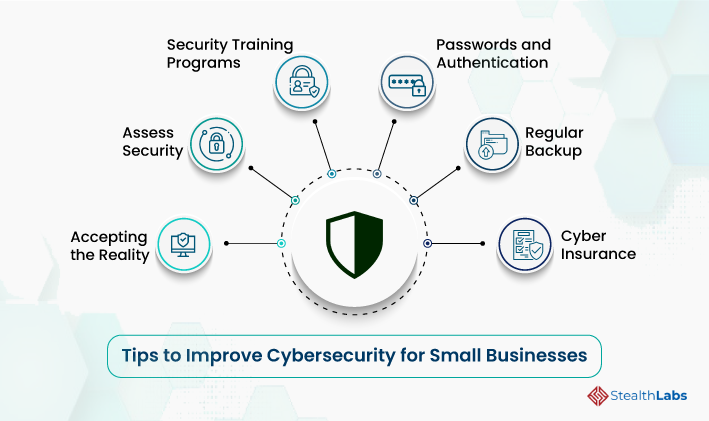Cyber threats are growing rapidly. Small businesses are often targeted.
Protecting your business with strong cyber security is crucial. Many small business owners think they are too small to be noticed by hackers. This misconception can lead to serious consequences. Hackers know small businesses might not have strong defenses. They see them as easy targets.
Cyber attacks can disrupt operations, damage reputations, and lead to financial loss. Understanding and implementing basic cyber security measures can make a huge difference. It helps safeguard sensitive data and maintains customer trust. This guide will explore essential strategies to protect your small business from cyber threats. Stay informed and prepared to keep your business safe.
Introduction To Cyber Security
As a small business owner, you might think you’re too small to be a target for cyber threats. However, the reality is quite different. Cyber security is not just a concern for large corporations. It’s crucial for businesses of all sizes, including yours. Understanding cyber security can be the difference between safeguarding your business and facing devastating consequences.
Importance For Small Businesses
Why is cyber security so vital for small businesses? You might not have the same resources as a large corporation, but you have something that’s equally valuable: trust. Your customers trust you with their sensitive information. A breach can shatter that trust and damage your reputation.
Small businesses are often seen as easy targets. Hackers know you might not have the most robust security systems in place. Yet, the financial and personal data you handle is just as enticing. Protecting this data isn’t just about preventing financial loss; it’s about preserving the integrity and trust you’ve built with your clients.
Current Threat Landscape
The cyber threat landscape is constantly evolving. As a small business, you face threats like phishing scams, ransomware attacks, and malware. These threats don’t discriminate based on business size. They can cripple operations and result in financial loss.
Imagine receiving an email that seems legitimate, only to find it’s a phishing attempt. It happens more often than you think. Hackers use sophisticated tactics to trick you into revealing sensitive data. Are you prepared to identify and counteract these threats?
You need to stay informed about these evolving threats. Regular updates and training can help you recognize and mitigate risks. Simple steps, like educating your team about phishing scams, can make a big difference.
Cyber security is not optional. It’s a necessity. Ask yourself: Are you doing enough to protect your business? Small actions can lead to significant improvements in securing your business against digital threats.

Credit: advisorsmith.com
Common Cyber Threats
Small businesses face many cyber threats today. These threats can harm their operations. Understanding common cyber threats helps businesses protect themselves. Below, we explore two major threats: phishing attacks and ransomware.
Phishing Attacks
Phishing attacks trick people into giving away sensitive information. Attackers often use fake emails or websites. These look like they are from trusted sources. Clicking on these links can lead to data theft. It’s important for businesses to train employees. They should recognize suspicious emails and websites.
Ransomware
Ransomware is a type of malware. It locks users out of their systems. Attackers demand payment to unlock files. This can disrupt business operations. Regular data backups can help prevent data loss. Businesses should also update their software regularly. This keeps systems secure from ransomware threats.
Implementing Basic Protections
Small businesses can strengthen cyber security by implementing basic protections. Use strong passwords, update software regularly, and install firewalls. These steps help safeguard sensitive information and reduce the risk of data breaches. Simple measures can create a safer online environment for businesses.
Implementing basic protections in your small business can be a game-changer in the world of cyber security. It’s not about having the most complex systems, but rather ensuring the fundamentals are rock solid. Small businesses often underestimate the importance of basic security measures. Yet, these simple steps can save you from a world of trouble. Let’s dive into some practical actions you can take right now to fortify your business.Strong Password Policies
You might think your password is secure, but hackers are always finding new ways to crack them. Establishing a strong password policy is your first line of defense. Encourage everyone in your team to use passwords that are at least 12 characters long, mixing letters, numbers, and symbols. It’s tempting to use “123456” or “password,” but those are easy targets.Consider using a password manager to help store complex passwords securely. This tool can generate random passwords that are much harder to break. Have you ever had to reset your password because you forgot it? A password manager can prevent that hassle. Discuss the importance of unique passwords for every account and regular updates, maybe every three months. Wouldn’t it be nice to know your data is protected even if one password gets compromised?Regular Software Updates
Software updates are more than just new features; they often contain crucial security fixes. Hackers love outdated software because it’s easier to exploit. Make it a habit to check for updates weekly. Automate the process if possible, so you never miss an important patch.Think about the last time you ignored an update notification because you were too busy. That small delay could be an open door for cyber threats. Prioritize updates and protect your business data. It’s a simple action with profound impact. Set reminders for quarterly reviews of your software inventory. Are there programs you no longer use? Removing them reduces vulnerabilities.Implementing these basic protections won’t require a tech genius. They’re straightforward and easy to incorporate into your daily routine. By focusing on strong passwords and regular updates, you’re safeguarding your business from potential cyber threats. Wouldn’t it be reassuring to know that your business is more secure with these simple steps?Network Security Measures
In the realm of cyber security, network security measures are essential for small businesses. They serve as the first line of defense against cyber threats. Without them, your business’s sensitive data could be at risk. Implementing effective network security measures can be straightforward and immensely beneficial.
Firewalls And Antivirus
Firewalls act like vigilant gatekeepers for your network. They scrutinize incoming and outgoing traffic, blocking malicious data packets. Imagine a virtual security guard that never sleeps. Adding a firewall is a smart move to protect your digital assets.
Antivirus software is another essential tool. It identifies and removes harmful viruses from your system. Regular updates keep the antivirus prepared for new threats. You wouldn’t leave your front door open, so why leave your network unprotected?
Secure Wi-fi Networks
Your Wi-Fi network could be a vulnerable point in your security strategy. Changing the default password is a simple yet effective action. Use a strong password with a mix of letters, numbers, and symbols.
Consider setting up a guest network. This keeps your main network safe from potential breaches. When you separate guest access, you enhance security without compromising connectivity.
Think about the consequences of a weak Wi-Fi network. Could it lead to unauthorized data access? Strengthening your Wi-Fi security is not just a technical task—it’s a proactive step to safeguard your business.
Network security is vital, but how secure is your current setup? Implementing these measures can transform your business into a fortress against cyber threats. It’s time to take action and secure your network now.
Data Protection Strategies
Data protection is crucial for small businesses today. Cyber threats are on the rise. A solid data protection strategy can safeguard sensitive information. It ensures business continuity and builds customer trust. Let’s explore some effective data protection strategies for small businesses.
Data Encryption
Data encryption converts data into a code. Only authorized parties can read it. This method protects data from unauthorized access. It’s vital for sensitive information like customer details and financial records. Use encryption tools to secure data both in transit and at rest. Regularly update encryption methods to stay ahead of threats.
Backup Solutions
Regular data backups are essential. They prevent data loss during system failures or cyberattacks. Use cloud-based services for automatic backups. They offer flexible storage and easy access. Keep multiple backup copies in different locations. Test your backups regularly to ensure data recovery. This practice minimizes downtime and data loss.
Employee Training And Awareness
Employee training and awareness are crucial aspects of cyber security for small businesses. With cyber threats becoming more sophisticated, educating your team on the basics of safe online behavior can protect your business from potential breaches. Simple, yet effective training can empower your employees to become the first line of defense against cyber attacks.
Recognizing Phishing Attempts
Phishing attempts are common and can easily trick unprepared employees. These deceptive emails often mimic trusted sources, urging recipients to click on malicious links or provide sensitive information. Have you ever received an email that looked like it was from your bank but asked for personal details? That’s a classic phishing tactic.
Educate your team on how to spot these scams. Check for suspicious sender addresses or links that don’t match the organization’s official website. Encourage them to question the urgency or threats presented in emails. When in doubt, verify the email’s authenticity through a direct call to the supposed sender.
Safe Internet Practices
Safe internet practices are not just a matter of securing passwords. They involve understanding what is safe to click, download, or share online. Encourage your employees to always use secure networks, especially when accessing company data remotely. Public Wi-Fi might seem convenient, but it’s often unsecured.
Implementing browser security measures can prevent accidental downloads of harmful software. Discuss the importance of keeping software and browsers updated. An outdated system might seem harmless, yet it’s a common entry point for cyber threats.
Have you considered regular security drills? They can reinforce safe internet practices and keep cyber security fresh in your team’s mind. Ask yourself, how often do you remind your team about these practices?
By prioritizing employee training and awareness, you’re not only protecting your business but also empowering your team to handle potential cyber threats confidently. This proactive approach can save you from costly data breaches and foster a culture of security within your organization.
Developing A Cyber Security Plan
Crafting a cyber security plan is crucial for small businesses. This plan helps protect sensitive data from cyber threats. Simple steps can significantly enhance security and safeguard business operations.
Developing a cyber security plan is crucial for small businesses. Cyber threats are increasing, making security a top priority. A solid plan protects sensitive data and builds trust with customers. It also helps avoid costly breaches. Start by understanding the risks and preparing to respond effectively.Risk Assessment
Begin with a comprehensive risk assessment. Identify valuable data your business holds. Assess potential threats to this data. Consider both internal and external risks. Evaluate current security measures in place. Determine weaknesses or gaps in your defenses. Prioritize threats based on their potential impact. This process helps in allocating resources effectively.Incident Response Plan
An incident response plan is essential. It outlines steps to take during a cyber attack. Define roles and responsibilities for team members. Ensure everyone knows their part in managing incidents. Create a communication strategy for stakeholders. Regularly update the plan to reflect new threats. Practice with simulated attacks to test your response. A well-prepared team can minimize damage and restore operations quickly.
Credit: www.stealthlabs.com
Leveraging External Resources
Small businesses face unique challenges in cyber security. They often lack resources to build a comprehensive defense. Leveraging external resources can provide essential support. This approach enhances security without overwhelming costs. It allows businesses to access expertise and tools they might not have in-house.
Managed Security Services
Managed Security Services (MSS) offer a practical solution. They provide continuous monitoring and management of security systems. This helps businesses detect threats early. MSS providers employ experienced professionals. These experts handle complex security issues efficiently. This allows small businesses to focus on growth. The cost of MSS can be adjusted based on needs. This makes it a flexible option for businesses of all sizes.
Government Support Programs
Government support programs are valuable resources for small businesses. They offer guidance and financial assistance. These programs help in building robust security frameworks. Many countries provide grants for security improvements. Some offer free training on cyber security best practices. This helps businesses understand potential threats. It also teaches them how to protect their data effectively. Utilizing these programs can significantly enhance a business’s cyber resilience.
Monitoring And Maintenance
Monitoring and maintenance are the backbone of effective cyber security for small businesses. Many owners overlook these crucial elements, thinking their initial security setup is enough. But cyber threats evolve constantly, demanding regular attention and updates to your security measures. Neglecting these aspects can leave your business vulnerable to cyber attacks, which can be devastating, especially for small businesses.
Regular Security Audits
Think of regular security audits as a health check-up for your business’s digital environment. These audits help you identify vulnerabilities before they turn into bigger problems. By routinely reviewing your security protocols, you ensure your defenses are up to date.
Consider scheduling these audits at least quarterly. This frequency allows you to stay ahead of potential threats. Moreover, audits can reveal weaknesses in your current systems, giving you the opportunity to patch them promptly.
Continuous Improvement
Cyber security is not a set-it-and-forget-it solution. Continuous improvement is essential to adapt to new threats. Small businesses must be proactive in updating their security measures.
Ask yourself, are your current strategies effectively protecting your data? If not, it’s time to consider updates or additional training for your team. Encourage your staff to stay informed about the latest security trends and threats.
Improvement also involves feedback from your audits. Use insights from these checks to refine your security protocols. This ensures you remain one step ahead in safeguarding your business.
Monitoring and maintenance might seem overwhelming initially. However, they are indispensable to your business’s safety. With regular audits and continuous improvement, you build a resilient shield against cyber threats. Are you ready to take these steps to protect your business? Your proactive approach can make all the difference.

Credit: networkassured.com
Conclusion And Future Trends
Small businesses must prioritize cyber security to protect sensitive data from threats. Future trends include AI-powered security systems and increased focus on employee training. These advancements help safeguard businesses and maintain customer trust.
Cyber security is crucial for small businesses. Protecting data and systems should be a priority. As technology advances, new threats emerge. Businesses need strategies to stay safe and grow.Emerging Technologies
New tools help businesses defend against cyber threats. Artificial intelligence can analyze patterns and detect anomalies. Blockchain offers secure ways to store and share data. These technologies empower businesses with better security solutions.Machine learning improves threat detection. It learns from data to predict attacks. Small businesses benefit from these advanced tools. They enhance protection without complex setups.Staying Ahead Of Threats
Threats evolve constantly. Hackers find new ways to breach systems. Regular updates and training are essential. Employees should recognize phishing scams. Businesses need to implement strong password policies.Monitoring systems is vital. Use firewalls and antivirus software. Regularly back up data to prevent loss. Develop a response plan for security breaches. Being prepared reduces risks significantly.In the future, cyber security will demand more attention. Small businesses must stay informed about trends. Adopting new technologies early can give them an edge.Frequently Asked Questions
How Much Does Cyber Security Cost For A Small Business?
Cyber security for a small business typically costs between $1,000 and $5,000 annually. Costs vary by services, tools, and business needs. Investing in robust security measures helps protect sensitive data and prevent breaches. Seek tailored solutions to ensure effective protection within your budget.
Do Small Businesses Need Cyber Security?
Yes, small businesses need cyber security. Cyber threats target businesses of all sizes. Protecting data and systems is crucial. Implementing security measures helps prevent data breaches and financial loss. Investing in cyber security builds customer trust and ensures business continuity.
Stay protected against evolving cyber threats.
What Are The 5 C’s Of Cyber Security?
The 5 C’s of cyber security are Change, Compliance, Cost, Continuity, and Coverage. These elements help businesses protect data, minimize risks, and ensure compliance. Understanding each component aids in crafting a robust security strategy, ensuring comprehensive protection against cyber threats.
Do 60% Of Small Businesses Fail After A Cyber Attack?
Around 60% of small businesses shut down within six months after a cyber attack. Cyber threats can devastate finances and operations. Strengthening cybersecurity is crucial to prevent breaches and ensure business survival. Entrepreneurs should prioritize security measures to protect their digital assets and customer data.
Conclusion
Protecting your small business is crucial. Cyber threats are real and rising. Simple steps can make a big difference. Train your staff regularly. Update software to keep systems safe. Invest in strong passwords and firewalls. Monitor activity for any unusual signs.
Seek expert help if needed. Prioritize security to safeguard your data. Secure your business today for peace of mind. Stay vigilant and proactive. Your efforts can prevent costly breaches. Protect your business and build trust with customers. Cybersecurity is not just an option.
It’s a necessity for every small business owner.










